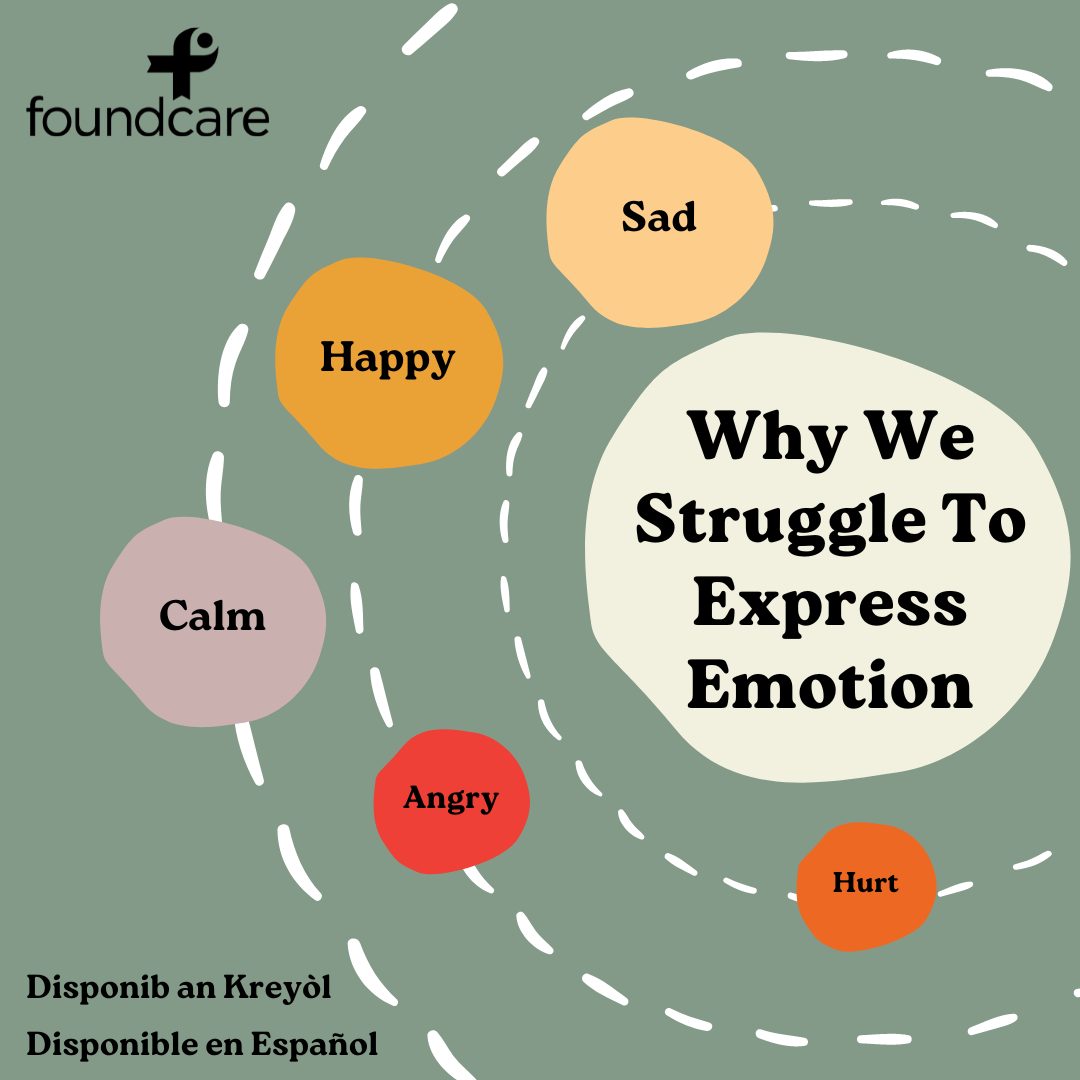Fear is often the reason why people find it hard to express their emotions openly and honestly.
Por qué nos cuesta expresar emociones
Los adultos que luchan por expresar sus emociones tienen una cosa en común; de niños, aprendieron que no era seguro hacerlo. Aunque a la mayoría de los adultos no se les enseñó intencionalmente a ocultar o retener sus emociones cuando eran niños, los padres a menudo enseñaron esta lección sin darse cuenta, modelados por las generaciones anteriores a ellos que no sabían nada mejor.
Es posible que haya aprendido a no expresar sus necesidades emocionales cuando sus sentimientos fueron frecuentemente desestimados. “No es tan malo” o “estarás bien” son respuestas que enseñan a los niños a ignorar lo que su mente y cuerpo les están diciendo. Si de niño se burlaron de usted por mostrar sus emociones, es posible que tenga dificultades para expresar sus emociones hoy por miedo al rechazo. Los adultos que tienden a ocultar o retener las emociones pueden recordar un momento en el que sus padres descartaron sus sentimientos o les dijeron que dejaran de ser tan emocionales. No importa cómo usted o un ser querido fueron moldeados cuando eran niños, reconocer, abordar y expresar sus emociones como adulto es vital para mejorar la capacidad de conectarse con usted mismo y con los demás.
Tienes una personalidad muy sensible. Las personas altamente sensibles a menudo son descritas negativamente como demasiado sensibles porque experimentan el mundo con mayor emoción. Ser una persona altamente sensible conlleva sus propios desafíos porque es fácil mostrar emociones pero no es fácil explicar por qué se sienten de la manera que se sienten. Aquellos con personalidades sensibles pueden verse profundamente afectados por el estado de ánimo de otras personas, angustiarse fácilmente por las experiencias normales, tienden a retraerse fácilmente cuando se les critica, juzga o se les miente, y son muy empáticos con los humanos y los animales. A aquellos con una personalidad sensible probablemente se les enseñó a una edad temprana a 'endurecerse', lo que los llevó a sentirse avergonzados por las emociones que sienten. Si usted o un ser querido tienen una personalidad muy sensible, es importante darse tiempo para adaptarse al cambio, crear un entorno tranquilo y calmado al que pueda retirarse, darse tiempo para relajarse después de un día ajetreado y darse la oportunidad para expresar emociones sin temor.
Evitas el conflicto a toda costa. La evitación de conflictos es un tipo de comportamiento para complacer a las personas que generalmente surge de un miedo profundamente arraigado a molestar o decepcionar a los demás. Cambiar de tema para evitar una discusión, estar de acuerdo cuando no está de acuerdo y no expresar sus verdaderos sentimientos son todas formas de evitar conflictos. Estas tendencias se remontan a crecer con padres que se concentraban demasiado en las faltas pequeñas, se quejaban mucho o se mostraban desdeñosos, distraídos o desinteresados durante las interacciones. Cuando ocultas tus emociones porque temes cómo reaccionarán los demás, niegas tu propia experiencia. El conflicto es una oportunidad para decir tu verdad y no siempre tiene que resolverse en el momento. Puede ser útil crear un plan antes de confrontar a alguien sobre un problema definiendo claramente lo que le gustaría resolver y escribiendo los hechos clave que desea cubrir.
Sientes que deberías estar feliz todo el tiempo. El perfeccionismo emocional es cuando estableces un estándar imposible para tener un control total de tus sentimientos, a menudo disfrazando todas las emociones percibidas como negativas en un esfuerzo por no parecer débil o patético. Crecer con padres que tenían expectativas demasiado altas o en un entorno en el que le enseñaron que los sentimientos deben guardarse para uno mismo podría desempeñar un papel. La verdad es que no siempre podemos ser racionales y tener el control de nuestras emociones, ni se puede esperar que siempre demos un espectáculo positivo. Aprender a expresar tus sentimientos apropiadamente, aceptándolos con compasión y paciencia, y permitiéndote sentir de verdad, es la clave para una buena salud emocional. Las emociones negativas siempre señalarán un problema que necesita tu atención. Reprimir estas emociones solo causará daños físicos y emocionales a tu salud.
Odias ser vulnerable. El miedo a la vulnerabilidad es, en última instancia, un miedo al rechazo o al abandono. Si creciste con padres que pasaban muy poco tiempo contigo o eran negligentes, lo más probable es que aprendiste desde el principio que distanciarte de los demás te ayuda a evitar que te lastimen. Como adulto, es posible que te encuentres intencionalmente sumergido en el trabajo, la escuela u otras actividades y te resulte difícil conectarte emocionalmente con los demás. Ser vulnerable es la única forma de conectar contigo mismo y con los demás. Puede practicar ser vulnerable pidiendo ayuda cuando la necesite, compartiendo sus sentimientos con los demás, dando y recibiendo comentarios sin estar demasiado a la defensiva y aprendiendo a estar presente y en el momento con sus seres queridos. Será difícil al principio, pero se volverá más fácil con la práctica.
El miedo es a menudo la razón por la cual a las personas les resulta difícil expresar sus emociones de manera abierta y honesta. Podemos aprender a expresar emociones difíciles a los demás aprendiendo primero a ser emocionalmente vulnerables con nosotros mismos. Practica etiquetar las diferentes emociones que sientes y permítete sentir esas emociones completamente y sin juzgar. Escribir un diario es una excelente manera de escribir las emociones que experimentas y puede ayudar a crear el hábito de pensar en cómo te sientes y por qué te sientes de esa manera.
En FoundCare, nuestros proveedores entienden la importancia de un enfoque integral de la atención que incluye la mente, el cuerpo y el espíritu, razón por la cual nuestros servicios de salud del comportamiento están integrados con nuestra atención primaria (no se ofrecen como un servicio independiente). Si está experimentando problemas de salud mental, puede ser beneficioso consultar a un médico para averiguar si algún problema de salud subyacente le está causando angustia antes de ser derivado a un especialista en salud del comportamiento. Llame al 561-432-5849 para programar una visita de atención primaria hoy.
Por favor, disculpe las posibles errores de traducción.
By FoundCare's Behavioral Health Team
Adults who struggle to express their emotions have one thing in common; as children, they learned it was not safe to do so. Although most adults were not intentionally taught to hide or withhold their emotions as children, parents often taught this lesson inadvertently, modeled by the generations before them who did not know better.
You may have learned not to express your emotional needs when your feelings were frequently dismissed. “It’s not that bad” or “you’ll be fine” are responses that teach children to ignore what their mind and body are telling them. If you were teased or made fun of for showing emotion as a child, you may struggle to express emotions today for fear of rejection. Adults who tend to hide or withhold emotions may recall a time when their parents dismissed their feelings or told them to stop being so emotional. No matter how you or a loved one were molded as a child, acknowledging, addressing, and expressing your emotions as an adult is vital to improving the ability to connect with yourself and others.
You have a highly-sensitive personality. Highly sensitive people are often negatively described as being too sensitive because they experience the world with greater emotion. Being a highly sensitive person comes with its own challenges because it is easy to show emotion but not easy to explain why they feel the way they do. Those with sensitive personalities can be deeply affected by other people’s moods, become distressed easily by normal experiences, tend to easily withdraw when criticized, judged, or lied to, and are very empathetic towards humans and animals. Those with sensitive personalities were most likely taught at a young age to ‘toughen up' leading them to feel ashamed or embarrassed by the emotions they feel. If you or a loved one have a highly sensitive personality, it is important to give yourself time to adjust to change, create a quiet and calm environment that you can retreat to, allow yourself time to unwind after a busy day, and give yourself the freedom to express emotions without fearing judgment.
You avoid conflict at all costs. Conflict avoidance is a type of people-pleasing behavior that typically arises from a deep-rooted fear of upsetting or disappointing others. Changing the subject to avoid an argument, agreeing when you disagree, and not expressing your true feelings are all forms of conflict avoidance. These tendencies can be traced back to growing up with parents who were overly focused on small faults, complained a lot, or were dismissive, distracted, or uninterested during interactions. When you hide your emotions because you fear how others will react, you deny your own experience. Conflict is an opportunity to speak your truth and does not always have to be resolved when it happens. It can help to create a plan before confronting someone about an issue by clearly defining what you would like to resolve and writing down key facts you want to cover.
You feel like you should be happy all the time. Emotional perfectionism is when you set an impossible standard to have complete control of your feelings, often disguising all emotions perceived as negative in an effort to not appear weak or pathetic. Growing up with parents that had unrealistically high expectations or in an environment where you were taught that feelings should be kept to yourself could play a role. The truth is, we cannot always be rational and in control of our emotions, nor can we be expected to always put on a positive show. Learning how to express your feelings appropriately, embracing them with compassion and patience, and allowing yourself to really feel is the key to good emotional health. Negative emotions will always point to a problem that needs your attention. Suppressing these emotions will only cause physical and emotional damage to your health.
You hate being vulnerable. The fear of vulnerability is ultimately a fear of rejection or abandonment. If you grew up with parents who spent very little time with you or were neglectful, you most likely learned early on that distancing yourself from others helped you avoid being hurt. As an adult, you may find yourself intentionally buried in work, school, or other activities and find it difficult to emotionally connect with others. Being vulnerable is the only way to connect to yourself and others. You can practice being vulnerable by asking for help when you need it, sharing your feelings with others, giving and receiving feedback without being overly defensive, and learning to be present and in the moment with those you love. It will be difficult at first but will become easier with practice.
Fear is often the reason why people find it hard to express their emotions openly and honestly. We can learn how to express difficult emotions to others by first learning how to be emotionally vulnerable with ourselves. Practice labeling the different emotions you feel and allow yourself to feel those emotions fully and without judgment. Journaling is a great way to write down the emotions you experience and can help create a habit of thinking about how you feel and why you feel that way.
At FoundCare, our providers understand the importance of a comprehensive approach to care that includes the mind, body, and spirit, which is why our behavioral health services are integrated with our primary care (not offered as a standalone service). If you are experiencing mental health challenges, it can be beneficial to see a doctor to find out if any underlying health issues are causing you distress before being referred to a behavioral health specialist. Call 561-432-5849 to schedule a primary care visit today.













